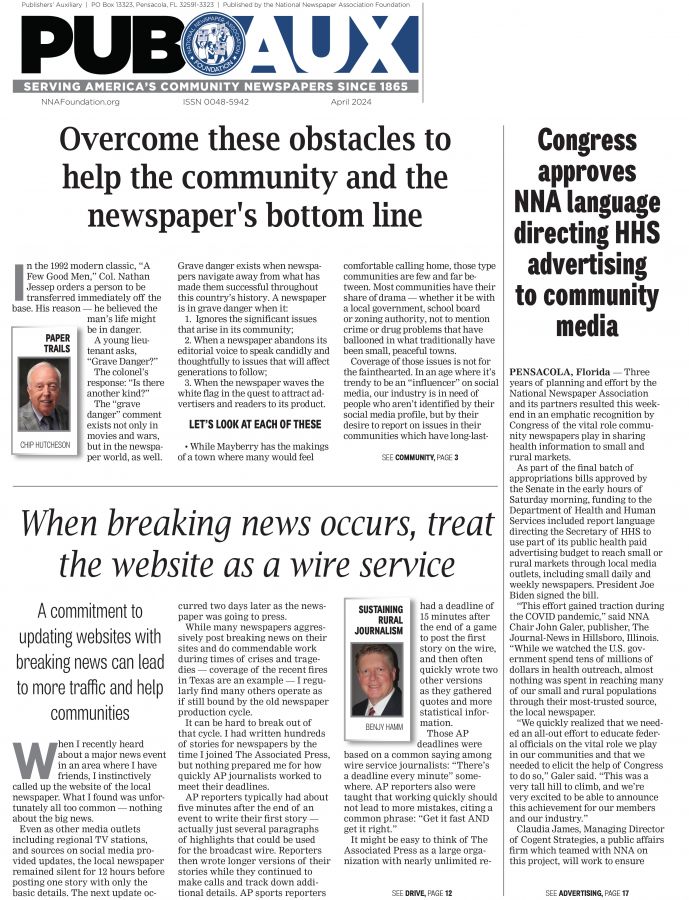PRC throws red flags at Saturday mail elimination
Sep 15, 2011
Elimination of Saturday mail service requires more study and a better implementation plan to protect impacted customers, the Postal Regulatory Commission said.
WASHINGTON—Elimination of Saturday mail service requires more study and a better implementation plan to protect impacted customers, the Postal Regulatory Commission said. And if Saturday mail goes away, the U.S. Postal Service should permit newspapers to use the mailbox for Saturday delivery, it said.
The PRC’s long-awaited opinion on five-day mail delivery takes a skeptical look at many of the Postal Service’s assumptions about the impact of the proposed change. While it does not firmly recommend for or against five-day mail, the PRC advises the Postal Service and Congress that the USPS has over-estimated how much money it would save, under-estimated how much business it would lose and failed to sufficiently analyze the impact on rural, remote and non-contiguous areas (like Alaska and Hawaii) if Saturday delivery is eliminated.
National Newspaper Association President Elizabeth K. Parker, co-publisher of Recorder Community Newspapers Inc. in Stirling, NJ, said the commission’s analysis would enlighten lawmakers.
“We have said all along that ending Saturday mail would hurt mail-dependent rural areas and slow down other mail service at a very critical time in our economy,” Parker said. “Apart from the impact on our newspapers—which would be substantial—taking this route to fix the Postal Service’s financial woes sets the nation’s universal mail service on a course fraught with danger for all postal customers. The commissioners agree with us that more analysis is needed, and we appreciate the time and attention it gave to this serious concern.”
NNA Postal Committee Chair Max Heath, who presented critical testimony to the PRC on the impact upon community newspapers, said the Commission had taken notice that forcing newspapers out of the mail could hurt local readers and also create a backlash effect against USPS by costing it more business.
“If we can’t get Saturday mail delivery and have to create our own delivery forces to reach our readers, we wind up pulling our mail out of a system that needs our business. If that happens, we create a new competitive delivery force, and that isn’t good for USPS. It isn’t great for newspapers either, in a high fuel-cost environment and at a time when our investment needs to be in covering the news in ever-changing products, not in creating new delivery teams. I’m pleased that the commission took notice of our viewpoint,” he said. “The best thing about the commission’s opinion is the attention it gave to the importance of local newspapers in informing local communities.”
Heath also said that the commission noted that newspapers are currently permitted to use the mailbox on rural routes for Sunday delivery and that he had recommended if Congress does eliminate Saturday mail, that exception should be extended to Saturdays. The PRC accepted his recommendation.
The opinion is not the final word on five-day mail. Congress currently requires six-day and rural delivery at the 1983 level. But that requirement is up for renewal each year with postal appropriations legislation. The USPS has said it intends to continue to push for repeal of the law so it can gain permission to set delivery levels on its own.
The USPS campaign for five-day mail, however, will now have to respond to the PRC’s reservations about potential financial gain to the USPS if Saturdays are eliminated. The commission’s findings included:
· A difference in the net annual savings in eliminating Saturdays. USPS claims $3.1 billion. The PRC says the savings would be $1.7 billion;
· The full savings would not be achieved until the third year after implementation;
· USPS would lose $.6 billion in net revenue; USPS says it would be $.2 billion;
· About 25 percent of First-Class and Priority Mail would be delayed by two days;
· The Postal Service did not evaluate the impact on customers who reside or conduct business in rural, remote or non-contiguous areas.














